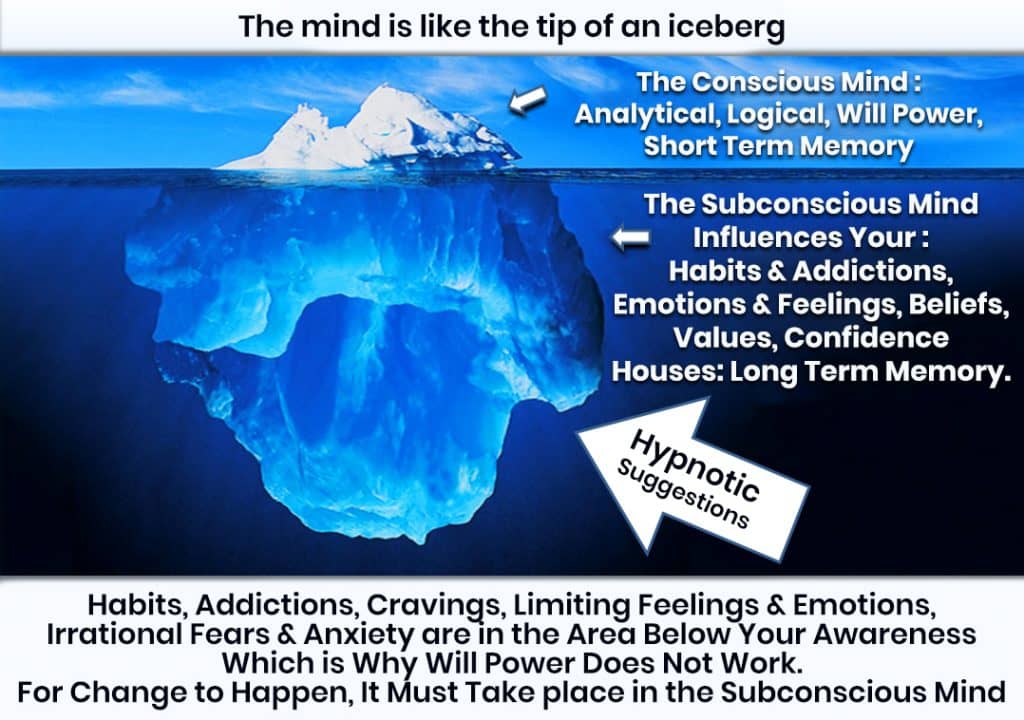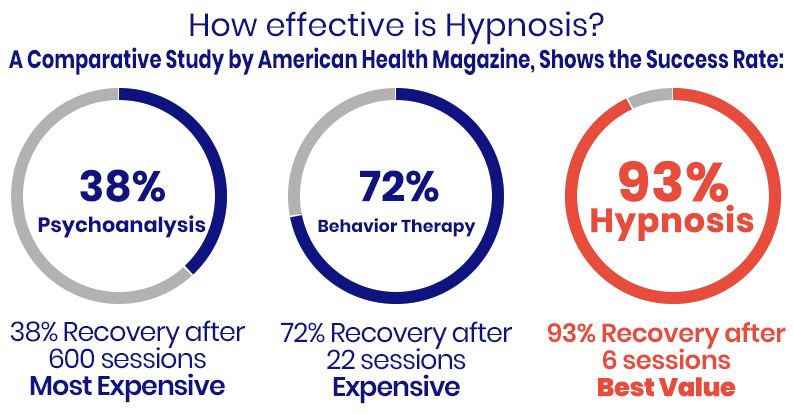
New York Hypnosis Frequently Asked Questions:
What is hypnosis?
To define hypnosis, one could say that it represents a distinctive state of conscious alertness where an individual’s focus shifts from the external environment, delving into an internal world filled with emotions, thoughts, and mental images. This distinct shift in awareness, often called the hypnosis meaning, involves both a concentrated focus and a lively imagination, leading to a process known as ‘hypnotic induction.’
Contrary to some assumptions, hypnosis isn’t akin to sleep. While under hypnosis, individuals maintain wakefulness, albeit with an intense focus that might give an outward impression of being in a trance or ‘zoned out.’ In certain situations, the profound calm and stillness of the body may resemble sleep, but rest assured, one is not asleep.
The essence of hypnosis lies in its ability to facilitate a deep inward focus, a state of intense concentration coupled with reduced peripheral awareness. This sharpened focus empowers us to use our minds to their full potential, unlocking new possibilities for experiences, making us more open to suggestions, and facilitating positive personal changes.
The trance-like state induced by hypnosis temporarily decreases the activity of the conscious, critical mind. This allows the hypnotic suggestions to take effect more seamlessly, influencing the mind with less resistance.
The common perception of hypnosis may link it with relaxation, but it’s important to note that relaxation isn’t a compulsory aspect of the hypnotic process. Indeed, relaxation often plays a role in clinical hypnosis due to its benefits in reducing anxiety and facilitating learning, but hypnotic phenomena can manifest even when individuals are fully awake and alert. The truly defining attribute of hypnosis is ‘dissociation,’ a phenomenon that enables the exploration of capabilities that are often hidden from conscious, deliberate control.
In a more structured perspective, hypnosis is divided into two components – ‘Trance Induction’ and ‘Suggestion.’ Trance induction is brought about by a series of directions and suggestions, honing one’s focus, while ‘Suggestion’ utilizes this focus for various therapeutic or transformative outcomes.
Hypnosis dates back over 200 years and is believed to have been founded by a physician – Franz Anton Mesmer, although the term hypnosis wasn’t used until 1843. Hypnotic trance is a natural occurring state that we experience every day. Daydreaming, and losing track of time, is a light state of hypnotic trance that we all experience. Drivers can experience “highway hypnosis”. This is when the driver suddenly realizes that he or she is closer to their exit than they had anticipated/realized.
When watching a sporting event, reading a great thriller, or listening to an amazing speaker, we can get so caught up in the experience that we can dissociate from the world around us. This disassociation is a sign of naturally occurring trance.
In hypnosis, you are mindful of your surroundings and what is going on. In fact, the brain wave activity of someone in hypnosisis consistent with the activity of someone awake and alert (not asleep) based on studies utilizing an electroencephalogram (EEG). While in hypnosis, an individual is capable of logic and reasoning, which is very different from a sleep state.
How are clients guided into the hypnotic trance state?
A hypnotic state can be initiated by using various relaxation techniques, guided imagery/visualization exercises, confusion, overload, reframing and a soothing voice. Hypnotic trance is a subjective experience. Clients may notice a feeling of relaxation, involuntary body movements, a weighted down heavy feeling, numbness, fluttering of your eyelids, tingling in the hands, a feeling of lightness, a sense of calm and various other feelings individual to the client.
While under hypnosis, can I be forced to do something against my will?
The short answer is No.
Some of the misconceptions surrounding hypnosis are based on what you’ve seen in movies, possibly read in fiction novels, television programs, a hypnotist show or cartoons. Once in a state of hypnosis, the foundation of the client’s value system remains intact. While in hypnosis you regain control and will not disclose anything confidential or personal that you do not wish to share with the hypnotist. Hypnotists are trained to be professionals. You want to be careful in your selection process and identify someone that you feel comfortable with, confident in his or her ability and that has the proper qualifications (Certified Hypnotist).
What type of results can I expect to achieve?
The links below will allow you to review reporting about the benefits of hypnosis.


Time Magazine – Scientific Proof that Hypnosis works for Weight Loss, Quit Smoking, and for Anxiety & PTSD
https://time.com/5380312/is-hypnosis-real-science/
NY Times – Sports Performance
Hypnosis for Sports Performance Article
ABC News – Surgery
http://www.abcnews.go.com/Health/WomensHealth/story?id=3533002&page=1
Washington Post – Children with Abdominal Pain
http://www.washingtonpost.com/wp-dyn/content/article/2007/11/30/AR2007113001997.html


Although numerous studies support the achievement of favorable results through hypnosis, by law the services we render are held out to the public as non-therapeutic hypnotism, defined as the use of hypnosis to inculcate positive thinking and the capacity for self-hypnosis. We do not represent our services as any form of medical, behavioral, or mental health care, and despite favorable research to the contrary, by law, we may make no health benefit claims for our services. As consulting hypnotists, we help our clients inculcate positive thinking and the capacity for self-hypnosis wherein we coach, teach, guide, instruct, or train motivated individuals to achieve their goals.
What areas can hypnosis be helpful in?
People have sought hypnosis for many reasons for instance weight loss, smoking cessation, insomnia, sports performance issues, phobias, self-improvement, insomnia, regression, stress, pain management, childbirth, empowerment, motivation and for so many other purposes (review tab on 99 Ways Hypnosis Can Help). A hypnotist is there to guide you and facilitate the behavior change that you desire. You have to determine what is your best course of action in achieving your desired results and if hypnosis is a viable option for you personally. Hypnosis has been around for centuries and is becoming a more and more common option in achieving goals and objectives/facilitating a behavioral change.
Will I remember what happened?
You generally will be aware of what has occurred and what you experienced during the session; however, it may take some time to fully digest what has transpired. You may experience time distortion regarding how long you were in hypnosis. In rare occurrences, you may not remember what has transpired but the majority of individuals do remember.![]()
![]()
What is the International Alliance of Certified Hypnotists & Therapists Certification?
The International Alliance of Certified Hypnotists & Therapists is the leading global certifying body of hypnosis practitioners and NLP coaches. It was established to promote a distinguished level of expertise and a share of best practices. They have established, and mandate compliance of, an extensive code of ethics to ensure the safety of clients who seek out hypnosis and NLP coaching practitioners. In order to become certified as a hypnotist, an intense and comprehensive training program is required along with an examination to ensure you have been properly trained.
What does a typical first hypnosis session consist of?
A typical first session consists of an intake and hypnosis to address the area of opportunity. The intake portion involves answering any questions the client might have, discussing the exact nature of the problem, and identifying exactly what a client wants to achieve. While in hypnosis the client will receive suggestions that will assist in promoting accelerated change.
How many sessions will be necessary to accomplish the program?
The number of sessions necessary to accomplish the program goal will vary based on the client and the presenting problem. Some clients require just 2 sessions while others require more. On average 3-8 sessions are required for most, but not all challenges.
Is Meditation Hypnosis?
While meditation and hypnosis might seem similar due to their emphasis on focused attention and awareness, they are distinct states of mind. When hypnotized, your awareness encompasses everything, but is centered on the hypnotist’s suggestions, assisting in addressing specific issues, be it quitting smoking or improving sleep.
In contrast, during meditation, while you are also aware of your surroundings, your attention is directed towards your breath, bodily sensations, or perhaps an object. This fosters self-awareness and insights, but it may not be as fast or effective in addressing specific problems as hypnosis.
What Are Hypnotic Suggestions?
Hypnotic suggestions are directions given during hypnosis that instruct how to perceive and interact with the world. These positive suggestions encourage desirable changes in our lives. Hypnosis assists in viewing problems from varied perspectives, enabling the identification of triggers for undesired behaviors, and providing the means to overcome these triggers.
These suggestions, delivered by the hypnotist while the subject is in a trance state, differ from positive affirmations and talk therapy, which do not typically utilize trance to lessen the critical faculty.
What Is a Post-Hypnotic Suggestion?
Post-hypnotic suggestions are instructions given during a hypnotic trance that are intended to be acted upon once the trance has ended. This could be a command such as “Upon waking each morning, you will feel refreshed and alert”. These suggestions are embedded in your subconscious during hypnosis and are then enacted in your everyday life, often without conscious deliberation. Some individuals may not recall carrying out the post-hypnotic act, some may be aware of it as it occurs, and others may only remember the suggestion after the act is completed.
How Does the Hypnotic Trance Affect the Brain?
Scientists have found that some parts of the brain, which help us with things like feelings, learning, and remembering, become more active when we are hypnotized. Studies suggest that hypnosis can also calm parts of the brain that control things like breathing and heartbeat, helping us relax deeply.
In another study, scientists from Stanford University used a special brain scan called an fMRI to see what happens in the brain during hypnosis. They found that certain areas change when a person is hypnotized. These areas help control things like awareness, how the body works, paying attention, and understanding our surroundings.
One interesting thing they found was that when people are hypnotized, they do less daydreaming and thinking about themselves. There’s also less activity in a part of the brain that helps us plan and do things. Scientists think this might be why people seem less self-aware when they’re hypnotized.
Because hypnosis changes how we focus and feel, and how we think about past experiences, the things we are told during hypnosis can lead to big changes in our brains.
In another study, scientists scanned people’s brains while they were hypnotized and found changes in specific parts of the brain. They saw changes in blood flow in these areas when people were at rest, remembering things, and during hypnosis.
The scientists noticed three key things in the brain during hypnosis:
- Firstly, they saw less activity in a part of the brain that helps us control impulses and make decisions, showing that the brain is very focused during hypnosis.
- Secondly, they found a stronger link between two areas of the brain. One area helps us switch tasks and remember things, and the other area helps us be aware of ourselves and our bodies.
- Finally, they noticed fewer connections between the part of our brain that helps us do things and the part of our brain that lets us be aware of what we’re doing.
This could mean we can do things without really thinking about them, like when we do things out of habit. When we’re hypnotized, this could make us more open to doing new things that we’re not used to.
Changes In How the Brain Functions During Hypnosis
During your normal waking hours, various parts of your brain cooperate to process information and form adaptable reactions to everything you come across. However, when you’re under hypnosis, this functioning of your brain alters significantly.
Research has shown that these same brain regions tend to work more independently during hypnosis, enabling you to be more receptive to suggestions and facilitating the creation of more vivid mental images. These are key aspects that enhance the effectiveness of hypnosis when used in conjunction with traditional therapy methods.
Brain waves, which operate at particular frequencies, can range from slower oscillations like delta, theta, and alpha to faster ones like beta and gamma.
As you close your eyes and begin to unwind, your brain wave frequency slows down. The state of deep relaxation and hypnosis is associated with the theta brain wave, which operates between 4 and 7.5 hertz. This state can inspire creativity, foster deep insights, and stimulate a sense of profound relaxation.
Studies link the hypnotic state mainly to theta oscillations, suggesting their role in emotional processing and memory recall. Under hypnosis, the theta state can enable remarkable shifts in the brain, such as detaching intense emotions from distressing memories, including responses of anxiety and fear.
On the flip side, the hypnotic state can also fortify positive connections, helping you foster a new mindset, develop fresh habits and coping mechanisms, and ultimately enhance your overall perspective.
Neurons in the brain communicate using specific chemicals known as neurotransmitters. Three primary neurotransmitters linked with hypnosis are dopamine, GABA, and serotonin. Additionally, certain chains of amino acids, called neuropeptides, are at play during hypnosis, activating brain receptors and even potentially blocking sensations of pain. This results in an emotional detachment from troubling memories and feelings. Furthermore, hypnosis triggers the release of endorphins, further alleviating pain and promoting a state of calm.


Why is it Important that Hypnotic Trance Alters the Brain?
The alterations in the brain during hypnosis can result in profound changes in brain activity. This can free us from old habits and thought patterns while “rewiring” our brains—creating new channels—to tackle and conquer thoughts, memories, and behaviors that have been obstacles in our lives.
These brain changes are completely natural. Hypnosis enables us to reshape our brains to eliminate harmful habits, process trauma and grief, build confidence and self-esteem, and shift our perspectives on numerous problems and issues. Therefore, hypnosis presents a way to alter harmful programming and empowers you to shape the life you wish to live.


